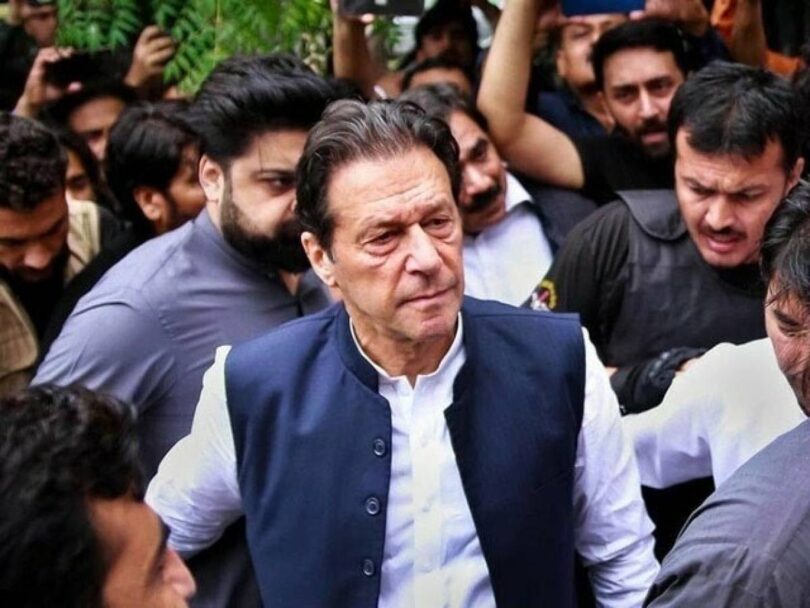Pakistan Tehreek-e-Insaf (PTI) founder and lifelong Chairman, Imran Khan arrested by the Police on Saturday shortly after the trial court hearing the Toshakhana case declared him guilty and sentenced him to three years imprisonment, together with Rs. 100,000 in fine, while inability in paying dues could further extend his jail term for another six months. The verdict, issued by Additional District and Sessions Judge Humayun Dilawar, comes amid the PTI chief’s contentions on both the maintainability of the case and repeated transfer requests based on perceived biases of the judge. However, the Islamabad High Court (IHC) directed the PTI to take up the matter of maintainability with the trial court that had already completed the case proceeding, and the concerned judge warned the PTI legal team to present final arguments otherwise the decision would be announced Saturday.
Another former Prime Minister and leader of a major political group has shared the destiny of his several predecessors through conviction by the court over the charges of misconduct, abuse of power and allegedly causing disgrace for the prestigious office of the country’s Chief Executive. After ouster from the Country’s most powerful position in April last year, more than 150 cases brought about against him which includes charges of sedition, inciting violence and spreading chaos, Toshkhana gift trading and declaration with the Electoral Watchdog, Al-Qadir Trust University and many more. Meanwhile, a grave risk of Khan’s indictment in the May 9’s violence and attacks on military installations still looms overhead because hundreds of the PTI leaders and party workers are currently under trail in the military courts.
There were wide ranging apprehensions and a stern reaction was expected from Imran Khan’s followers in case of Khan’s arrest in the cases currently under trial in several courts in Islamabad, Lahore and other cities. Surprisingly, only a few dozen individuals gathered outside Lahore’s Zaman Park, the family residence of the PTI Chief, to protest Khan arrest while a careful and low level protest trend/ campaign had been launched by the PTI Social media teams after their top leader was taken into custody by the Law Enforcement Agencies on Saturday. In the current scenario, the conviction of the PTI Chief could have long lasting effects on the future political landscapes in the country which is rapidly advancing toward nationwide general elections constitutionally planned to be held by October this year. Although, the PTI legal team is preparing to challenge Khan’s arrest in the upper court, however there are bright chances of the endorsement of his conviction by the superior judiciary as the case for Khan’s indictment has been filed by the Election Regulator. The ECP has already held thorough inquiry into the case and confirmed guilt of the popular leader in October last year, while the trial court just reproduced the ECP’s verdict and award punishment of the offence.
Historically, persistent political instability and long periods of dictatorial rule have badly spoiled the Country’s political landscape and gave birth to direct military interventions and secret political engineering by the military establishment over the past decades. That unconstitutional activity not only weakened the democracy and political institutions but also gave rise to bad practices in the politics including horse trading, election engineering, corruption and an increased role of feduals, money, and support of criminal gangs to reach victory stand in the electoral contest. As a matter of fact, politics of hate, violence and blame game has ruined the country’s politics General Zia’s martial law over the past three and a half decades that resulted in premature collapse of politically elected governments, early elections, persistent political unrest and an unsustainable economy during that period. After multiple experiences, the major political parties including the PML-N, and the PPP agreed to strike a charter of democracy that paved the way for political stability and completion of constitutional terms of the assemblies and the government for the first time in the country’s history. Unfortunately, the PTI and few others so-called revolutionary groups tore apart the political resilience in the society and rediscovered the politics of the 90s that finally ended up in the last year’s no confidence motion. Thus, recent years political anarchy led the nation to the brink of an economic collapse and added another black chapter in the history of Pakistan’s democracy.
Apparently, the current political leadership including the PTI and the PDM alliance failed in providing relief to the masses and added to the public depression and economic turmoil. The perception of Pakistani politics is not so promising at the moment. The country is due for a transition to caretaker setup but uncertainty and doubts still exist in the masses regarding the future events. Currently, Public is annoyed of the unceasing political experiments of immature Strategists who made the country a banana republic instead of securing prestige and sanctity of sole Nuclear power in the Muslim world. After-all, it is high time for the politicians to learn from their past mistakes, sit down together and strike a consensus agreement that drives the nation out of the current crises and lead the country toward economic revival and prosperity.







